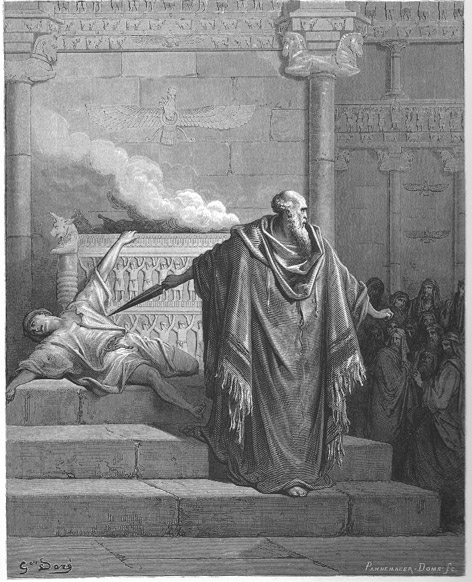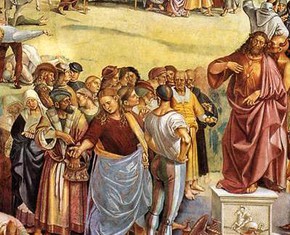The views expressed in our content reflect individual perspectives and do not represent the authoritative views of the Baha'i Faith.
The United Nations, in a review of the legal systems of all its member nations, now says that 23 of the world’s countries have actively-enforced apostasy laws. Those 23 countries, all with majority Muslim populations, sentence people convicted of apostatizing their Faith to a variety of punishments, from fines to imprisonment to whippings to the death penalty.
In 2012, a Pew Research analysis also found that nearly a quarter of the world’s countries and territories (22%) had anti-blasphemy laws or policies on the books, and one-in-ten (11%) had laws or policies criminalizing and penalizing apostasy.
These barbaric laws drew the world’s attention two years ago, when global media focused on an apostasy case in Sudan. Meriam Ibrahim, a 27-year-old pregnant woman, was sentenced to death for apostasy when she converted from Islam to Christianity after her marriage to a Christian man.
 In most of the countries where these antiquated laws exist, the Arabic word zindiq features prominently in the legal rationale for apostasy. Meriam Ibrahim—still in prison for her “crime”—is known as a zindiq.
In most of the countries where these antiquated laws exist, the Arabic word zindiq features prominently in the legal rationale for apostasy. Meriam Ibrahim—still in prison for her “crime”—is known as a zindiq.
Some fundamentalist Muslims use the word zindiq to describe any person who holds religious views or philosophies that run counter to the main Islamic dogmas prevalent in the culture. Zindiq can refer to “heretics” who oppose Islam; to “apostates” who attempt to change religions or withdraw from the Muslim faith; and to anyone who believes in a Faith that began after Islam, such as the Baha’i Faith. In reality, zindiq can identify anybody who follows an alternative spiritual path other than the dominant Muslim paradigm in any Islamic society.
This ugly, insulting word has a long history, going back to the medieval period, when the Muslim caliphate began to persecute and exterminate freethinkers, pagans, Manicheans and various others as apostates and heretics. As early as the 8th century, the Abbasid caliphs used their military to summarily put to death anyone accused of being a zindiq. In modern times and in many Muslim societies the word zindiq can refer to a member of any non-mainstream independent religion–or no religion.
Today a few Muslim cultures—Iran probably represents the most egregious example—brand the Baha’is as zindiq, and persecute them mercilessly as a result. In other less restrictive and fundamentalist Muslim cultures—Indonesia, for example, with the largest Muslim population in the world—the government recently accepted the Baha’i Faith as one of the country’s officially-recognized independent religions.
The Baha’i teachings firmly and unequivocally condemn the prejudice and persecution based on the religious intolerance exemplified by words like zindiq, heretic or apostate. To that end, Baha’u’llah explicitly outlawed any form of religious hatred, which for Baha’is represents the most absurd contradiction in terms. Baha’is view the founders and prophets of the world’s great Faiths as essentially one, and therefore see inter-religious conflict and persecution as the exact polar opposite of what those prophets originally taught:
The Bearers of the Trust of God are made manifest unto the peoples of the earth as the Exponents of a new Cause and the Revealers of a new Message. Inasmuch as these Birds of the celestial Throne are all sent down from the heaven of the Will of God, and as they all arise to proclaim His irresistible Faith, they, therefore, are regarded as one soul and the same person. For they all drink from the one Cup of the love of God, and all partake of the fruit of the same Tree of Oneness.
These Manifestations of God have each a twofold station. One is the station of pure abstraction and essential unity. In this respect, if thou callest them all by one name, and dost ascribe to them the same attributes, thou hast not erred from the truth. Even as He hath revealed: “No distinction do We make between any of His Messengers.” – Baha’u’llah, Gleanings from the Writings of Baha’u’llah, p. 50.
Baha’is believe in one continually unfolding religion, all given to humanity by one God. Throughout history, the Baha’i teachings explain, the great teachers and messengers who revealed and founded religions taught essentially the same message, tailored for the needs of the people and for the time when they appeared. Now, Baha’u’llah has brought humanity a new, joyful message of unity and harmony between the races and religions of the earth:
…the ages of darkness have passed away, and the century of light has come. Ignorant prejudices are being dispelled, and the light of unity is shining. The differences existing between nations and peoples will soon be annulled, and the fundamentals of the divine religions, which are no other than the oneness and solidarity of the human race, are being established. For thousands of years the human race has been at war. It is enough. Now let mankind, for a time at least, consort in amity and peace. Enmity and hatred have ruled. Let the world, for a period, exercise love. For thousands of years the nations have denied each other, considering each other as infidel and inferior. It is sufficient. We must now realize that we are the servants of one God, that we turn to one beneficent Father, live under one divine law, seek one reality and have one desire. Thus may we live in the utmost friendship and love, and in return the favors and bounties of God shall surround us; the world of humanity will be reformed; mankind, enjoy a new life; eternal light will illumine, and heavenly moralities become manifest. – Abdu’l-Baha, The Promulgation of Universal Peace, p. 65.
















Comments
Sign in or create an account
Continue with Googleor